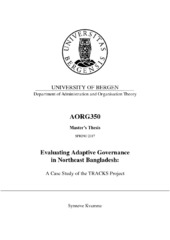Evaluating Adaptive Governance in Northeast Bangladesh: A Case Study of the TRACKS Project
Master thesis
Permanent lenke
https://hdl.handle.net/1956/16691Utgivelsesdato
2017-09-01Metadata
Vis full innførselSamlinger
- Department of Government [457]
Sammendrag
In the face of accelerating environmental issues, such as climate change, new modes of governance have emerged. One such approach is that of adaptive governance, which can be seen as a critical challenge to the conventional top-down regimes of environmental management. Despite having received increased attention and influence over the last two decades, the aspect of evaluation of adaptive governance remains largely unexplored in the literature, and there is a lack of a consistent, agreed upon framework for evaluation. This study intends to contribute to fill this gap in the scholarship by drawing on existing evaluation efforts in the adaptive governance literature and adopting a participatory evaluation approach. Specifically, it evaluates how one particular initiative, the TRACKS research project (TRAnsforming Climate Knowledge with and for Society), contributed to two communities’ climate adaptation in northeast Bangladesh, using adaptive governance as a theoretical and evaluative lens. This thesis describes how a novel, capital based evaluation framework for adaptive governance was constructed and tested with the TRACKS project. The method used in this study was qualitative interviews with citizen scientists, conducted in three rounds during 2016 and 2017. The evaluation of the TRACKS project revealed a significant impact on the communities’ human and social capitals, and a weak to moderate impact on the resource and technology capital, the political capital, and the institutional capital. Despite room for improvement, the evaluation framework proved a useful tool for evaluation of adaptive governance, as it allows for achievements and shortcomings to be easily identified. Importantly, its participatory component allows for the framework to be tailored to different contexts, which suggests it might have potential in other settings as well.
Utgiver
The University of BergenOpphavsrett
Copyright the author. All rights reserved.Beslektede innførsler
Viser innførsler beslektet ved tittel, forfatter og emneord.
-
Net Neutrality and Investment Incentives: An empirical analysis
Grønningsæter, Selma (Master thesis, 2022-06-01)This thesis looks at the effect that the removal of Title II regulations on the Internet service providers under the Restoring Internet Freedom Order of 2018 had on Internet service provider’s incentives to invest in their ... -
Life in transition: the case of young Eritreans in Norway
Kebedom, Yonas Zemuy (Master thesis, 2019-12) -
Evaluating the potential for natural capital investment to reverse soil degradation: a dynamic simulation approach exploring connections between soil health and money in England
Nichols, Jonathan David (Master thesis, 2019-08-06)Soils are a form of natural capital that support economic activity and human well-being. However, in England, national soil resources have been degrading over the last two centuries. The total annual economic cost of soil ...
